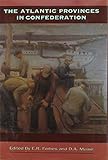The Atlantic Provinces in Confederation / ed. by Delphin Muise, Ernest Forbes.
Material type: TextSeries: HeritagePublisher: Toronto : University of Toronto Press, [1993]Copyright date: ©2001Description: 1 online resource (640 p.)Content type:
TextSeries: HeritagePublisher: Toronto : University of Toronto Press, [1993]Copyright date: ©2001Description: 1 online resource (640 p.)Content type: - 9780802058867
- 9781442657007
- 971.5 20
- F1035.8 .A765 1993eb
- online - DeGruyter
| Item type | Current library | Call number | URL | Status | Notes | Barcode | |
|---|---|---|---|---|---|---|---|
 eBook
eBook
|
Biblioteca "Angelicum" Pont. Univ. S.Tommaso d'Aquino Nuvola online | online - DeGruyter (Browse shelf(Opens below)) | Online access | Not for loan (Accesso limitato) | Accesso per gli utenti autorizzati / Access for authorized users | (dgr)9781442657007 |
Browsing Biblioteca "Angelicum" Pont. Univ. S.Tommaso d'Aquino shelves, Shelving location: Nuvola online Close shelf browser (Hides shelf browser)

|

|

|

|

|
No cover image available |

|
||
| online - DeGruyter Agent, Action, and Reason / | online - DeGruyter Atlantic Canadian Imprints : A Bibliography, 1801-1820 / | online - DeGruyter Essays in the History of Canadian Law, Volume IX : Two Islands, Newfoundland and Prince Edward Island / | online - DeGruyter The Atlantic Provinces in Confederation / | online - DeGruyter A Path Not Strewn With Roses : One Hundred Years of Women at the University of Toronto 1884-1984 / | online - DeGruyter Essays in the History of Canadian Law, Volume VI : British Columbia and the Yukon / | online - DeGruyter The Bruce Beckons : The Story of Lake Huron's Great Peninsula / |
restricted access online access with authorization star
http://purl.org/coar/access_right/c_16ec
Canada's four easternmost provinces, while richly diverse in character and history, share many elements of their political and economic experience within Confederation. In this volume thirteen leading historians explore the shifting tides of Atlantic Canada's history, beginning with the union of Nova Scotia and New Brunswick with Ontario and Quebec to form the Dominion in 1867. Continuing on through Prince Edward Island's entry into Confederation six years later and Newfoundland's in 1949, they take the story of Atlantic Canada up to the 1980s.Collectively their work sheds light on the complex political dynamic between the region and Ottawa and reveals the roots of current social and economic realities. Fragmentation versus integration, plenty versus scarcity, centre versus periphery, and other models inform their analysis.The development of regional disparity, and responses to it, form a major theme. The tradition of regional protest by Maritimers, and later Atlantic Canadians, runs deep; so does their commitment to the idea of an integrated Canadian nation. Protests, over the decades, have primarily been expressions of frustration at perceived exclusion from the full benefits of national union. The creation of national markets for labour, capital, and goods often operated to their detriment, and political decisions at the national level frequently reinforced rather than alleviated the regional predicament.More than an account of the wealthy and powerful, this book often places ordinary men and women at the centre of the story. Above all, it reveals the resilience of Atlantic Canadians as they have struggled to overcome their problems and to share in the benefits of life in the Canadian community.
Mode of access: Internet via World Wide Web.
In English.
Description based on online resource; title from PDF title page (publisher's Web site, viewed 01. Nov 2023)


